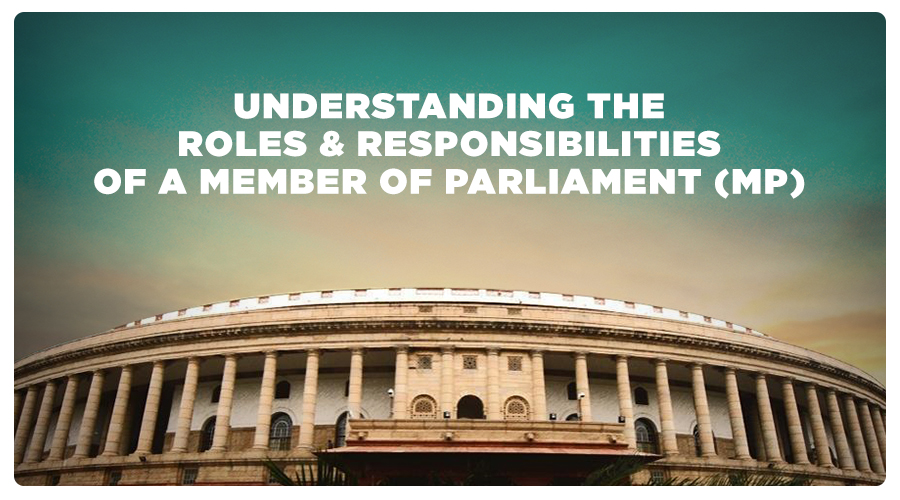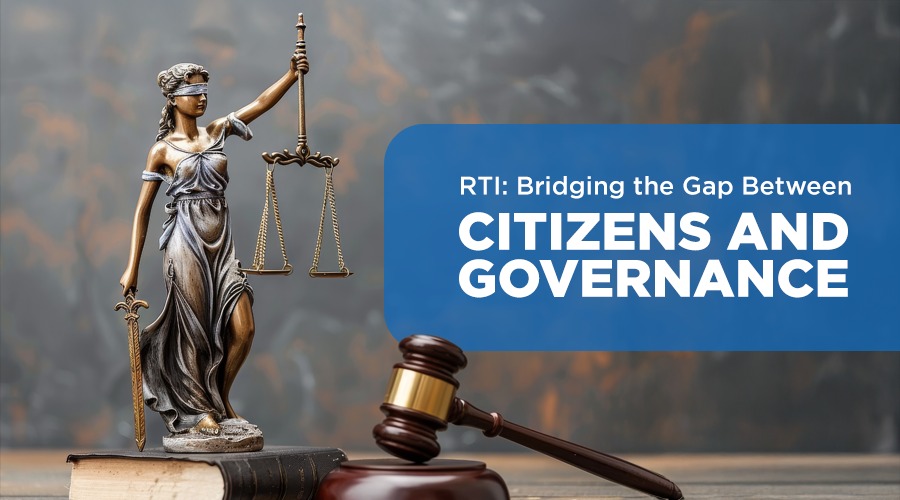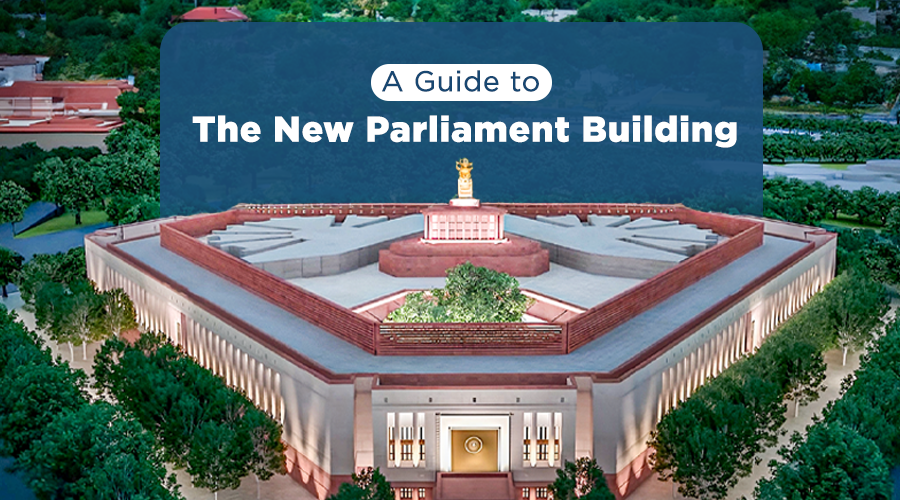India is known as the largest democracy in the world representing 1.3 billion people, governed by one of the most intricate, compounded and multilayered forms of governance. Due to the complex structure and muddling convictions, the majority of people are unaware of the true significance of the Parliamentary system and the roles and responsibilities of Members of Parliament. Do they exist only to pass or kill bills or do their responsibilities entail much more than what is visible on the surface level? Let’s explore.
The Structure:
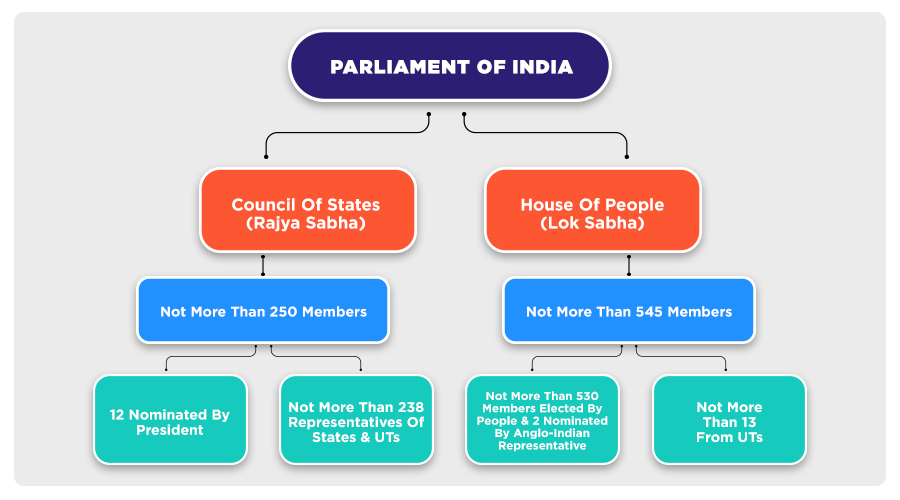
India’s supreme legislative body is the Parliament of India or the Bhartiya Sansad as described in the Hindi language. Nations in general are either defined as ‘Federal’ or ‘Unitary’ depending on the way their Govt. is organised. In a Unitary form of governance, the Central holds majority power, pertaining to administration and legislation, leaving the states with little autonomy. Whereas in a Federal structure, the states are identified on the basis of regions and ethnicity and enjoy varying forms of autonomy and some level of administrative and legislative powers. But when it comes to India, it is described as ‘quasi-federal’ where the States are Sovereign in the legislative field but the executive power is shared with the Central. The structure entails a bicameral legislature which is composed of the President of India and the two houses:
- Lok Sabha (House of the People): Also known as the lower house of Parliament consists of 543 members who are directly elected by citizens of India on the basis of universal adult franchise. As per Constitutional rights, every citizen of India who is over 18 years of age, irrespective of gender, caste, religion, or race and is otherwise not disqualified, is eligible to vote for the Lok Sabha. The Constitution provides that the maximum strength of the House be 552 members with a tenure of five years. To be eligible for membership in the Lok Sabha, a person must be a citizen of India and must be 25 years of age or older, mentally sound, should not be bankrupt, and should not be criminally convicted.
- Rajya Sabha (Council of States): The upper house is a permanent body of the Parliament that is immune to dissolution. One third of the members retire every second year, and are replaced by newly elected members. Each member is indirectly elected by members of legislative bodies for a term of six years. The Rajya Sabha can have a maximum of 250 members. It currently has a sanctioned strength of 245 members, of which 233 are elected from States and Union Territories and 12 are nominated by the President.
The President’s role as the Head of the Legislature is to summon and prorogue either Houses of Parliament or dissolve Lok Sabha. Whether one is nominated or elected to either House of Parliament by the President, they are referred to as the Members of Parliament (MP). The MPs of the Lok Sabha happen to be directly elected by the Indian citizen through voting in single-member districts, whereas the MP’s of Rajya Sabha are elected through proportional representation by the members of all State Legislative Assembly.
So, to summarize, an MP is the nominated member of either of the two houses of Parliament. They have the responsibility to work on behalf of the constituency, state or union territory they are representing. Those who wish to be a Member of Parliament must fulfil the following criteria:
- An Indian citizen
- Is of at least 25 years of age
- A voter from any parliamentary constituency
- An independent candidate needs 10 proposers
- Candidate of a well-known party, requires one proposer, for the purpose of nomination.
- Make a security deposit of Rs. 10000
The Roles & Responsibilities Of MPs:
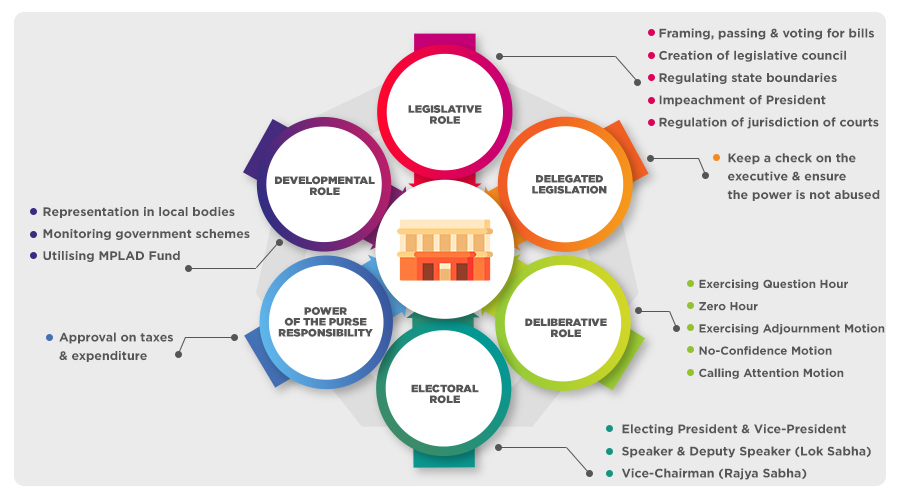
A Member of Parliament (MP) holds a very crucial position in a multitiered parliamentary democracy like India. MP’s have specific roles and responsibilities, even those from the ruling party/coalition. MPs do bear the responsibility for making the laws our country is run by. They play a pivotal role in designing and supervising the programs however, they have no role in the implementation of these programs. While MPS do represent the citizens in their constituency, they cannot be held accountable for civic issues. So, what do their responsibilities include? The broad responsibilities of the Members of Parliament entail the following:
- Legislative Responsibility: Passing Laws of India in the Lok Sabha.
- Oversight Responsibility: Ensuring that the Executive (i.e., Government) performs its duties efficiently.
- Representative Responsibility: Representing the people’s views and aspirations of their constituencies in the Parliament of India (Lok Sabha).
- Power of the Purse Responsibility: Approving and overseeing government-proposed revenues and expenditures.
- The Union Council of Ministers, also Members of the Parliament, bear the additional responsibility of the Executive.
Legislative Role:
First and foremost, an MP is a legislator. In the case of ordinary bills (Article 100), more than 50% of MPs present in the house need to vote in favour of the Bill for it to become an Act. deemed passed by that House. The Constitutional Amendment Bill under Article 368 requires at least two-thirds of the MPs present and 50% of the strength of the House to vote on it for it to become an Act. MPs also need to debate on various provisions of the Bill, and then propose amendments if they wish to. In short, framing laws, discussing and voting for bills and amendments, participating in legislative matters like:
i) Creation of legislative council
ii) Increasing or decreasing physical state boundaries
iii) Regulation of jurisdiction allotted to Supreme Court & High Court
iv) Participating in the impeachment process of President
Delegated Legislation:
After a bill is signed into a law, the power to make detailed regulation rests in the hands of the executive. That’s when the role of an MP comes into play, wherein he/she keeps a check on the executive and ensures the power is not abused by the Govt.
Deliberative Role:
As per the Indian constitutional scheme, the Executive is accountable to the legislature. This is maintained partly by MPs, as they are to ask questions to government ministers. The procedures in both Houses of Parliament have rules for a ‘Question Hour’ and a ‘Zero Hour’. Here there are starred and unstarred (oral and written questions which can be asked by MPs). In Karnataka, the questions are specific to the governance and civic issues of the state. These questions and debates are vital as they allow an MP to be an active voice of their constituency. Other responsibilities an MP carries to exercise power over the executive are to initiate Adjournment Motion, No-Confidence Motion, Calling Attention Motion etc., if necessary.
Electoral Role:
An MP also plays a vital role in electing the President and Vice-President of a country. Lok Sabha MPs also have the power to elect the Speaker and Deputy Speaker of the house, whereas a Rajya Sabha MP elects the Vice-Chairman of the house.
Power of the Purse Responsibility:
No tax can be levied and no expenditure incurred by the government except with the approval of the Parliament. The Budget is therefore presented to the Parliament. Every MP is the voice of his/her constituency.
Developmental Role:
An MPs developmental role in their State or constituency is important. They generally fulfil these roles through these provisions:
- Representation in local bodies: Panchayats and municipalities play a key role in bringing development to the grassroots. The provisions of Part IXA of the Constitution outlines how the Legislature of a State can provide for the representation of an MP at the intermediate and District level Panchayats. It also states how the State legislature can provide for the representation of MPs in municipal bodies within the constituency. Moreover, MPs can be nominated to District Planning Committees.
- Vigilance and monitoring of government schemes: MPs play important roles in monitoring of some Centrally Sponsored Schemes in their States. Beyond these responsibilities, MPs can work towards catalysing schemes of the State and Central government in their own constituencies. This requires a proactive engagement with public officials at both the Central and State levels. It also requires greater interaction with constituents in order to better understand their needs and concerns. This is how MPs can better represent the people of their state and their constituency. Finally, they can even demand for greater information, both qualitative and quantitative, about their constituencies, so that they might share it with the citizens. Since they are elected representatives, they have legitimate political authority for direct engagement with the private or corporate sector to ensure the industrial development of their constituencies. These responsibilities have been successfully carried out by many MPs in the past, and they continue to follow the same today.
MPLADS:
Under the Member of Parliament Local Area Development Scheme (MPLADS), launched in
1993, every MP is allocated Rs 5 crore per year for initiating developmental works in his constituency. The scheme is administered by the Ministry of Statistics and Programme Implementation (MoSPI), which lays down guidelines on the works and activities permitted under MPLADS. The funds under MPLADS are channeled through the respective implementing agencies in the district.
The Key Takeaways:
We happen to have many MPs who understand the weight of their roles as legislators and do their best in their work. These MPs try to highlight issues on the floor of Parliament so as to establish their grasp on certain issues to not only their colleagues in Parliament, but also to the larger world. While all the parameters of good governance have been laid out, it isn’t easy to monitor the raw data accurately and analyze how the MPs are performing. Some states do not even have a requisite system that makes real numbers available to the citizens. However, we must remember they are not responsible for the implementation relating to civic issues. MPs need to perform their actual duties well. There is a need for more extraordinary powers, funds, and capacity to be injected into the panchayats (local level governance in the rural region) and municipalities. It is bound to boost the democratic spirit.
References:
- https://nios.ac.in/media/documents/srsec317newE/317EL11.pdf
- https://legislativebodiesinindia.nic.in/parliament%20of%20india.htm
- https://web.archive.org/web/20180610045012/http://www.prsindia.org/parliamenttrack/about-parliament/the-indian-parliament-198
- https://web.archive.org/web/20160416084719/http://lawmin.nic.in/olwing/coi/coi-english/coi-4March2016.pdf
- https://www.iilsindia.com/study-material/810726_1618671525.pdf


